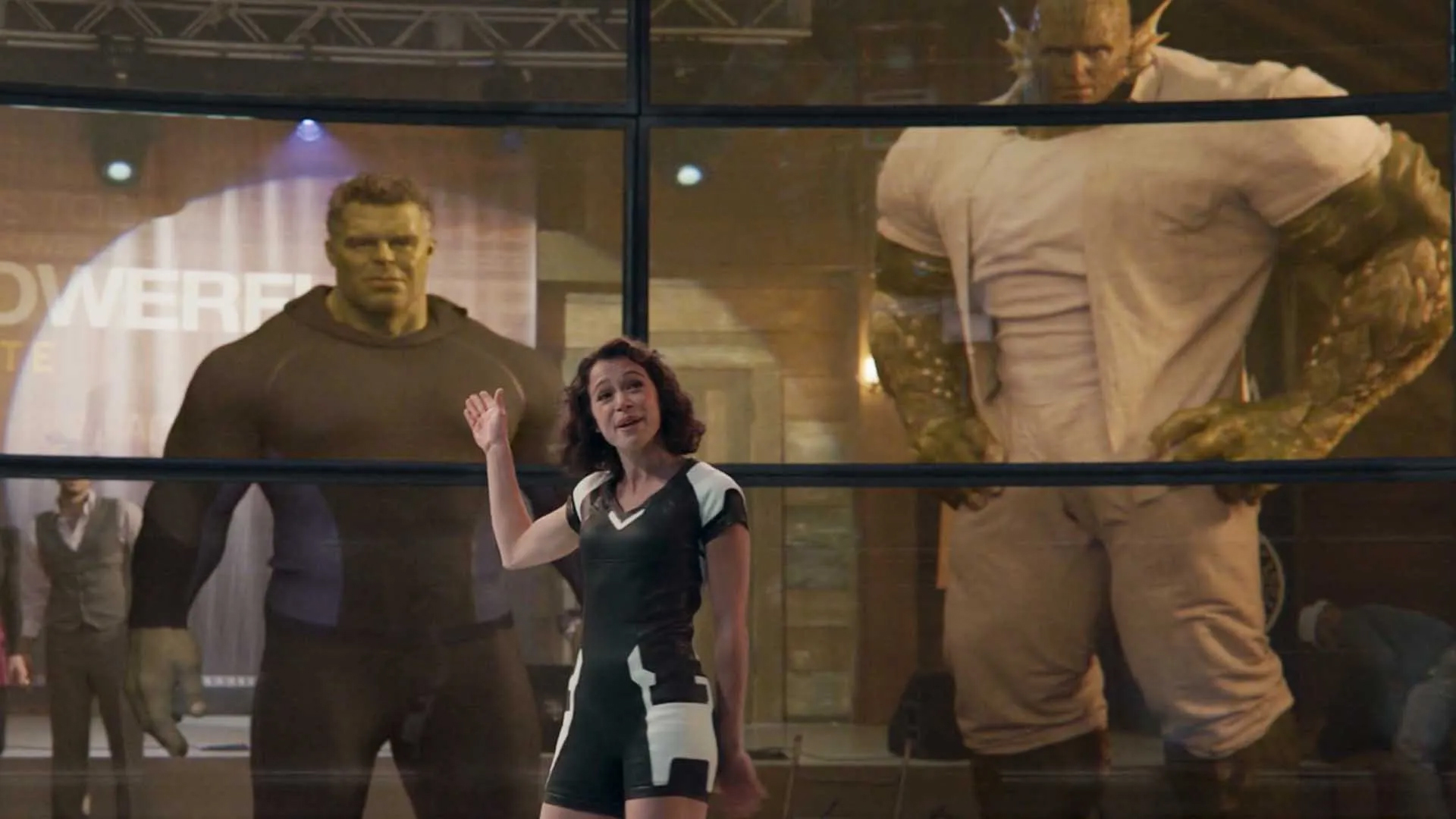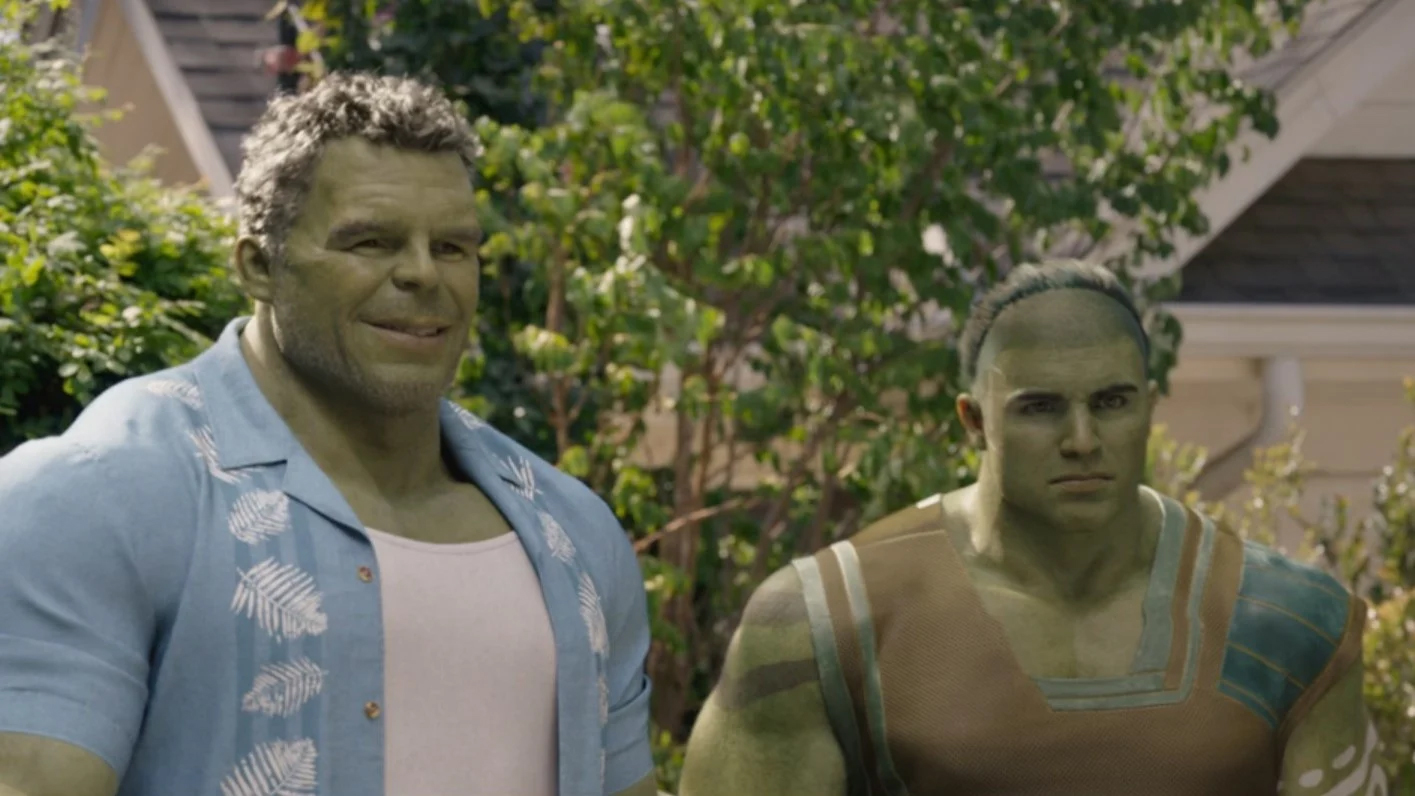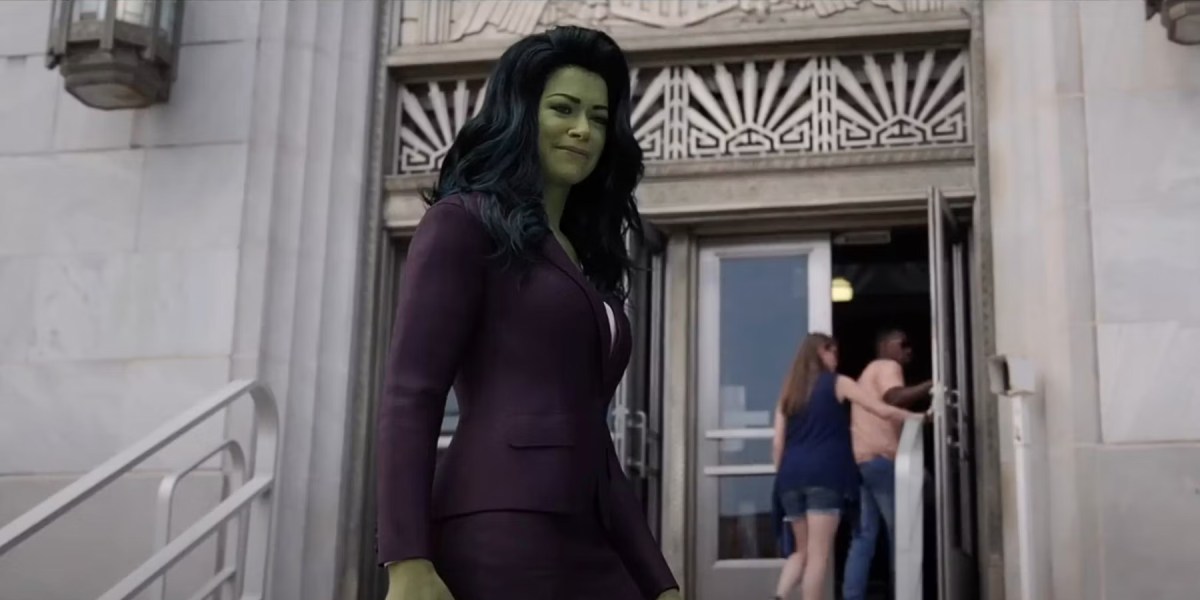This discussion and review contains spoilers for She-Hulk episode 9, the season finale, “Whose Show Is This?”
In its season finale, “Whose Show Is This?,” She-Hulk discovers that the rules of the Marvel Cinematic Universe (MCU) can bend, but they won’t break.
“Whose Show Is This?” builds to a conventional action climax, populated by all of the elements seeded to this point. Todd Phelps (Jon Bass) is revealed as the online poster known as “HulkKing,” responsible for both the public shaming of Jennifer Walters (Tatiana Maslany) and stealing her blood in an effort to turn himself into a superhero. “I didn’t just get handed superpowers,” he opines as someone literally hands him a syringe that will give him superpowers. “I had to earn them.”
Tying the various plot elements together, Phelps has decided to hold a meet up at the retreat owned by Emil Blonsky (Tim Roth), who is delivering a special guest speech in his monstrous form. Jennifer’s arch-enemy Titania (Jameela Jamil) smashes through the wall, ready for action. Then Jennifer’s cousin Bruce Banner (Mark Ruffalo) breaks through the ceiling, fresh from his trip to Sakaar and ready for a long overdue rematch against Blonsky as the Abomination.
None of this makes any sense, but it’s also somewhat typical of the way that these sorts of shows end, from WandaVision through to Moon Knight. Deeply frustrated, Jen breaks the fourth wall to directly address the audience. “This can’t possibly be where this season was going,” she complains, clearly having failed to binge The Falcon and the Winter Soldier. “This is a mess. None of these storylines make any sense.” She directly asks the viewer, “Is this working for you?”
Jen has spent a significant portion of She-Hulk directly addressing the audience. A surprising amount of these fourth-wall asides have effectively been Jen voicing her none-too-subtle complaints about the ways in which She-Hulk is beholden to the continuity, production logistics, and cross-promotion of the shared universe. The title of the finale alludes to one such aside in “The People vs. Emil Blonsky,” when Jen warned the viewer, “Just remember whose show this actually is.”

“Whose Show Is This?” leans into that tension, to the point that the season’s big conflict seems to have little to do with either Titania or Todd Phelps, but instead She-Hulk itself wrestling with the rules that govern these streaming shows. “This isn’t even a reluctant superhero story,” Jen complains to the camera. “I’m just getting screwed over. Is this what you guys want?” Like a lot of fourth-wall breaking, it’s interesting how Jen’s asides implicitly implicate the audience.
“Whose Show Is This?” is fun and playful in a way that She-Hulk really should have been from the start. The episode’s opening is a loving homage to the original Incredible Hulk television show, and it is frankly a much more compelling way of explaining “who (she) is and how (she) came to be” than the dramatically inert extended flashbacks in “A Normal Amount of Rage.” Why hasn’t She-Hulk been this playful from the start? Why hasn’t it been willing to exploit the potential of its central conceit?
As the episode’s climax threatens to devolve into chaos, Jen again breaks the fourth wall. She pushes the show out into the Disney+ menu and climbs into Marvel Studios Assembled to get access to the behind-the-scenes team working on She-Hulk. It’s a clever idea. While the She-Hulk comics have frequently had the character break the fourth wall, it’s arguably closest to that issue of Animal Man that had the superhero confront writer Grant Morrison about their scripting of him.
On paper, this is a great idea. Jen gets to visit her writers’ room and engage in a critique of the kind of storytelling that turns so many of these shows into generic content soup. Jen even gets to make some very valid criticisms, pointing out the way that having Bruce show up would undermine her story, the franchise’s over-reliance on “super soldier serum,” and how the payoff with Todd is an idea lifted “from every other superhero story ever.”

However, there is only so far that She-Hulk can push this particular button. There is a sense that Marvel Studios isn’t actually interested in engaging in this sort of discussion, but instead just acknowledging it as a get-out-of-jail-free card. Notably, Jen doesn’t actually engage with any of her writers. Unlike in something like, say, Curb Your Enthusiasm, Jen’s writers don’t play themselves. Jessica Gao is played by Eden Lee. Zeb Wells is played by Justin Miles.
When Jen wants to confront “Kevin,” the episode still feels obligated to deliver a generic action set piece to get her there. Jen still has to fight her way through a hallway of goons like Black Widow (Scarlett Johansson) in Iron Man 2. The fight isn’t even particularly good, but it just needs to be there. Instead of confronting Kevin Feige, she confronts a sentient computer algorithm named “K.E.V.I.N.” It stands for “Knowledge Enhanced Visual Interconnectivity Nexus.”
This is very cute. Indeed, it’s charming that the production team even built Feige’s trademark baseball cap into the design of the artificial intelligence. However, it also undercuts any actual engagement with the legitimate criticisms of the production methodology that threatened to turn the finale of She-Hulk into a chaotic mess, just as it did for WandaVision, The Falcon and the Winter Soldier, Moon Knight, and various others.
Ultimately, there’s something quite dystopian about all this. When Jen points out that her show is a half-hour legal comedy, K.E.V.I.N. coldly responds, “If that’s what you’d prefer to call it.” Jen makes an impassioned argument that the formula is stale and tired, ending with the radical suggestion, “I propose we don’t have to do that.” K.E.V.I.N. handles this the same way that any producer handles notes from the talent; it promises to consider it and assures Jen that they won’t ever meet again.

Jen drops back into her show, and the ending has superficially changed. However, none of the actual issues within the show have been resolved. Jen’s surface-level critiques of the finale have all been tidied up; Todd no longer transforms into a physical monster, Bruce no longer gate-crashes her finale, Titania doesn’t throw herself into the brawl, and Emil has confessed his crimes. However, none of the underlying issues with this setup have actually been confronted or explored or deconstructed.
To pick one example: Emil. Jen’s proposed ending has Emil realize the error of his ways, surrendering to the authorities for violating his parole. However, that doesn’t explain why Emil was hosting a bunch of misogynists at his retreat. Also, if Jen rewrote the ending so Emil wasn’t in his Abomination form for these speaking engagements, did he violate his parole? She-Hulk has consistently suggested that Emil is a fundamentally decent guy, so what exactly is his relationship to online misogyny?
Neither the original proposed ending of “Whose Show Is This?” nor Jen’s revised draft explains any of this. Emil is there because Tim Roth is a recurring cast member and the show felt obligated to pay that off in some way, even if it made no sense. The post-credits sequence even features Wong (Benedict Wong) taking Emil out of custody. Does that imply that his confession of his parole violation wasn’t in earnest? Why is Wong sheltering a guy who courts an audience of misogynists?
There is a similar smaller beat at the episode’s coda, with Bruce dropping into the Banner family’s Fast & Furious-style cookout. During her conversation with K.E.V.I.N., the artificial intelligence had argued that Bruce’s appearance was necessary to seed some important plot point going forward, only for Jen to counter that this is her show. However, Bruce shows up and does his bit for brand synergy by announcing his son, Skaar (Wil Deusner). K.E.V.I.N. gets what K.E.V.I.N. wants.
For all that “Whose Show Is This?” is an endearing exercise in breaking the fourth wall, demonstrating a playfulness sorely missing from the rest of the season to this date, the She-Hulk finale answers its titular question in the most cynical manner possible. This is K.E.V.I.N.’s show, and it always will be.






Published: Oct 13, 2022 11:30 am